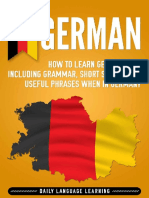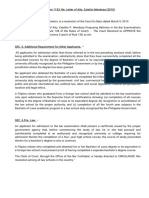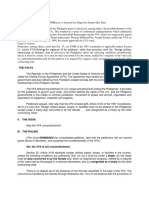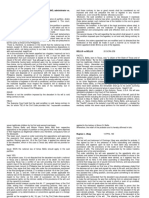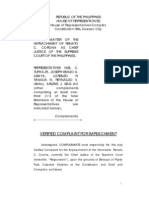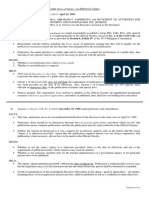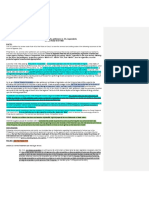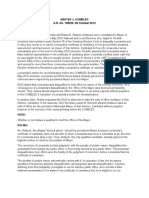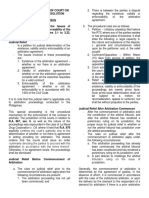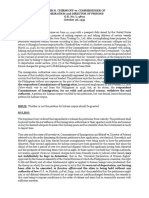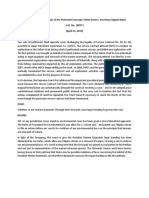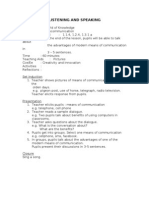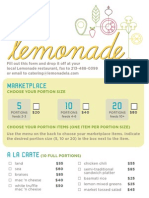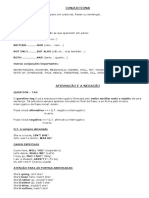B74 Philip Morris Inc. v. Court of Appeals, GR 91332, 16 July 1993, Third Division, Melo (J) - BAUTISTA PDF
B74 Philip Morris Inc. v. Court of Appeals, GR 91332, 16 July 1993, Third Division, Melo (J) - BAUTISTA PDF
Uploaded by
loschudentCopyright:
Available Formats
B74 Philip Morris Inc. v. Court of Appeals, GR 91332, 16 July 1993, Third Division, Melo (J) - BAUTISTA PDF
B74 Philip Morris Inc. v. Court of Appeals, GR 91332, 16 July 1993, Third Division, Melo (J) - BAUTISTA PDF
Uploaded by
loschudentOriginal Title
Copyright
Available Formats
Share this document
Did you find this document useful?
Is this content inappropriate?
Copyright:
Available Formats
B74 Philip Morris Inc. v. Court of Appeals, GR 91332, 16 July 1993, Third Division, Melo (J) - BAUTISTA PDF
B74 Philip Morris Inc. v. Court of Appeals, GR 91332, 16 July 1993, Third Division, Melo (J) - BAUTISTA PDF
Uploaded by
loschudentCopyright:
Available Formats
B74
Philip Morris, Inc., Benson & Hedges (Canada), Inc., and Fabriques of Tabac Reunies, S.A.,
vs. The Court of Appeals and Fortune Tobacco Corporation
G.R. No. 91332, Melo, July 16, 1993
Digested by: Bautista, Lenard
Facts:
Philip Morris, Incorporated is a corporation organized under the laws of the State of
Virginia, USA. The two other plaintiff foreign corporations are wholly-owned subsidiaries
of Philip Morris, Inc. As registered owners "MARK VII", "MARK TEN", and "LARK" per
certificates of registration issued by the Philippine Patent Office, plaintiffs-petitioners
asserted that defendant Fortune Tobacco Corporation has no right to manufacture and sell
cigarettes bearing the allegedly identical or confusingly similar trademark "MARK" in
contravention of Section 22 of the Trademark Law.
Private respondent Fortune Tobacco Corporation admitted petitioners' certificates of
registration with the Philippine Patent Office. The respondent alleged that it has been
authorized by the Bureau of Internal Revenue to manufacture and sell cigarettes bearing
the trademark "MARK", and that "MARK" is a common word which cannot be exclusively
appropriated. Also, the respondent pointed out that lots of workers employed will be laid
off as a consequence of an injunction, and that the government will stand to lose P120M
of specific taxes from January to July 1989.
Issue: Whether or not irreparable injury should be preceded by actual use of their
registered trademarks in commerce in the Philippines
Held: Yes. A fundamental principle of Philippine Trademark Law is that actual use in
commerce in the Philippines is a pre-requisite to the acquisition of ownership over a
trademark or a tradename. In fact, a prior registrant cannot claim exclusive use of the
trademark unless it uses it in commerce.
In view of the explicit representation of petitioners in the complaint that they are not
engaged in business in the Philippines, it inevitably follows that no conceivable damage
can be suffered by them not to mention the foremost consideration heretofore discussed
on the absence of their "right" to be protected.
The critical facts in an infringement case are not presented. Petitioners therefore, may not
be permitted to presume a given state of facts on their so called right to the trademarks
which could be subjected to irreparable injury and in the process, suggest the fact of
infringement. Such a ploy would practically place the cart ahead of the horse.
Dispositive Portion
The petition is hereby DISMISSED and the Resolutions of the Court of Appeals dated
September 14, 1989 and November 29, 1989 are hereby AFFIRMED.
You might also like
- Accomplishment: Supreme Student Government SY 2020 - 2021Document4 pagesAccomplishment: Supreme Student Government SY 2020 - 2021Lorymae Padillo71% (17)
- German How To Learn German Fast - Including GrammarDocument161 pagesGerman How To Learn German Fast - Including GrammarCharlieLevitt88% (25)
- The Sword and The Olive - A Critical History of The Israeli Defense Force (PDFDrive) PDFDocument506 pagesThe Sword and The Olive - A Critical History of The Israeli Defense Force (PDFDrive) PDFЯна БевзюкNo ratings yet
- Political Law Article I, National Territory 1. What Comprises The National Territory?Document27 pagesPolitical Law Article I, National Territory 1. What Comprises The National Territory?Norjannah MangandogNo ratings yet
- Lazo V Sps VillasDocument3 pagesLazo V Sps VillasJepoy FranciscoNo ratings yet
- 24 Philip Morris Vs Fortune TobaccoDocument3 pages24 Philip Morris Vs Fortune TobaccoSilver Anthony Juarez PatocNo ratings yet
- Sarmiento v. COMELEC, 212 SCRA 307Document2 pagesSarmiento v. COMELEC, 212 SCRA 307loschudentNo ratings yet
- Republic of The Philippines vs. Rosemoor Mining and Development CorporationDocument2 pagesRepublic of The Philippines vs. Rosemoor Mining and Development CorporationloschudentNo ratings yet
- 45 - (Prov. of Camarines Sur vs. Director of Lands)Document2 pages45 - (Prov. of Camarines Sur vs. Director of Lands)loschudentNo ratings yet
- 150 Amonoy V GuiterrezDocument1 page150 Amonoy V GuiterrezAnonymous bOncqbp8yiNo ratings yet
- SC Bar Matter 1153Document2 pagesSC Bar Matter 1153theamorerosaNo ratings yet
- Articles 1597-1599Document10 pagesArticles 1597-1599Ramos GabeNo ratings yet
- Labor Law Notes (Duano) 1Document9 pagesLabor Law Notes (Duano) 1FernandoNo ratings yet
- Philippine Veterans Bank v. NLRC 1999Document2 pagesPhilippine Veterans Bank v. NLRC 1999Allanis Rellik Palamiano100% (1)
- Sample Bar Answers AbuelDocument5 pagesSample Bar Answers AbuelMadeleine RomeroNo ratings yet
- HB 2493 - Political DynastyDocument5 pagesHB 2493 - Political DynastyBayan Muna Party-listNo ratings yet
- Bayan V Zamora DigestDocument2 pagesBayan V Zamora DigestSecret SecretNo ratings yet
- Ahmadou Sadio DialloDocument1 pageAhmadou Sadio DialloRic SaysonNo ratings yet
- Digest (C)Document12 pagesDigest (C)Rodolfo Lustiano DuenasNo ratings yet
- City of Baguio Vs BusuegoDocument4 pagesCity of Baguio Vs BusuegocharmssatellNo ratings yet
- Polirev Cases Freedom of ExpressionDocument77 pagesPolirev Cases Freedom of ExpressionJana PincaNo ratings yet
- Case DigestDocument13 pagesCase DigestJannaNo ratings yet
- Dilemna 4Document3 pagesDilemna 4dennisgdagoocNo ratings yet
- Property in Relationship To The Person Whom It Belongs (Art. 419-426)Document31 pagesProperty in Relationship To The Person Whom It Belongs (Art. 419-426)Valen Grace MalabagNo ratings yet
- RA No. 11360 - Service ChargesDocument2 pagesRA No. 11360 - Service ChargesPvZ2 AddictNo ratings yet
- Epifanio MunesesDocument6 pagesEpifanio MunesesKrizha PrudenciadoNo ratings yet
- The Legal Profession-A Matter of Privilege - AzarragaDocument12 pagesThe Legal Profession-A Matter of Privilege - AzarragaAlvin ClaridadesNo ratings yet
- In Personam, and in Rem or Quasi in Rem?Document4 pagesIn Personam, and in Rem or Quasi in Rem?Sittie Rainnie BaudNo ratings yet
- 3) Pua vs. Deyto PDFDocument10 pages3) Pua vs. Deyto PDFresjudicataNo ratings yet
- Marzalado v. PeopleDocument6 pagesMarzalado v. PeopleerforNo ratings yet
- Criminal Law Review Case Digest - Fiscal GarciaDocument15 pagesCriminal Law Review Case Digest - Fiscal GarciaNeil MayorNo ratings yet
- Testate Estate of Joseph G. Brimo, JUAN MICIANO, Administrator vs. Andre BrimoDocument12 pagesTestate Estate of Joseph G. Brimo, JUAN MICIANO, Administrator vs. Andre BrimoHaze Q.No ratings yet
- Sample Civil Case Pre Trial BriefDocument3 pagesSample Civil Case Pre Trial BriefArifKadatuanNo ratings yet
- People V GarciaDocument3 pagesPeople V GarciaAnonymous 4IOzjRIB1No ratings yet
- Digest - Spouses Mendiola V CADocument2 pagesDigest - Spouses Mendiola V CAIana VivienNo ratings yet
- 2013 Administrative Law Review TSNDocument38 pages2013 Administrative Law Review TSNEliza DenNo ratings yet
- Pharmaceutical Vs DOHDocument4 pagesPharmaceutical Vs DOHKarl AkiatanNo ratings yet
- Bilbao - Vs - People DigestDocument1 pageBilbao - Vs - People DigestCharlie BartolomeNo ratings yet
- Criminal LawDocument6 pagesCriminal LawJason RodriguezNo ratings yet
- Tolentino v. CatoyDocument2 pagesTolentino v. CatoyCarissa CruzNo ratings yet
- Legal Ethics I. Preliminaries: Practice of LawDocument12 pagesLegal Ethics I. Preliminaries: Practice of LawJustin CebrianNo ratings yet
- Luceres v. Trinidad-AbayaDocument2 pagesLuceres v. Trinidad-AbayaMaya Angelique JajallaNo ratings yet
- Impeachment Complaint vs. SC CJ Renato CoronaDocument70 pagesImpeachment Complaint vs. SC CJ Renato CoronaImperator FuriosaNo ratings yet
- CIV2Document2 pagesCIV2Rina LibaNo ratings yet
- Canon 1-3 P2Document104 pagesCanon 1-3 P2Glace OngcoyNo ratings yet
- Bayan v. Zamora, G.R. No. 138570, October 10, 2000Document2 pagesBayan v. Zamora, G.R. No. 138570, October 10, 2000zeynNo ratings yet
- ESCRA Araullo V Aquino GR 209287Document60 pagesESCRA Araullo V Aquino GR 209287Krystine GodalleNo ratings yet
- People VS ChoiDocument2 pagesPeople VS ChoiMarjo PachecoNo ratings yet
- Burbon v. GabarDocument2 pagesBurbon v. GabarRidzanna AbdulgafurNo ratings yet
- 2017 Political and Public International Law Bar Questions and AnswersDocument10 pages2017 Political and Public International Law Bar Questions and AnswersJean Ben Go SingsonNo ratings yet
- 08 - Lidasan v. ComelecDocument2 pages08 - Lidasan v. ComelecAizaLiza100% (1)
- US v. McPartlinDocument3 pagesUS v. McPartlinN.V.100% (1)
- Magallona Vs ErmitaDocument29 pagesMagallona Vs ErmitaChi KoyNo ratings yet
- Gaanan Vs IacDocument2 pagesGaanan Vs Iacdiamajolu gaygonsNo ratings yet
- Can A Non-Lawyer Teach in A Law SchoolDocument1 pageCan A Non-Lawyer Teach in A Law SchoolMiguel CastilloNo ratings yet
- Heirs of San Miguel Vs Court of AppealsDocument1 pageHeirs of San Miguel Vs Court of AppealsCass ParkNo ratings yet
- Case Digest 1-4Document10 pagesCase Digest 1-4Patricia Ann Sarabia ArevaloNo ratings yet
- Fundamental Principles of LaborDocument3 pagesFundamental Principles of LaborKristina Marinela G. RamosNo ratings yet
- Tanada vs. Tuvera G.R. No. L-63915 StatC PDFDocument1 pageTanada vs. Tuvera G.R. No. L-63915 StatC PDFmerebearooNo ratings yet
- B74 Philip Morris Inc. v. Court of Appeals, GR 91332, 16 July 1993, Third Division, Melo (J) - BAUTISTADocument1 pageB74 Philip Morris Inc. v. Court of Appeals, GR 91332, 16 July 1993, Third Division, Melo (J) - BAUTISTAloschudent100% (1)
- 056 Philip Morris V CADocument1 page056 Philip Morris V CAmiss.escoberNo ratings yet
- Philip Morris v. Fortune TobaccoDocument2 pagesPhilip Morris v. Fortune TobaccoNeil Aubrey GamidoNo ratings yet
- GR No 91332 16-07-1993Document11 pagesGR No 91332 16-07-1993Mary LeandaNo ratings yet
- PHILIP MORRIS Vs FORTUNE TOBACCODocument2 pagesPHILIP MORRIS Vs FORTUNE TOBACCOPatricia Blanca SDVRNo ratings yet
- Phillip Morris v. Fortune TobaccoDocument2 pagesPhillip Morris v. Fortune TobaccogailacdNo ratings yet
- PHILIP MORRIS vs. Fortune TobaccoDocument3 pagesPHILIP MORRIS vs. Fortune TobaccoboybilisNo ratings yet
- Evidence BOC 2022Document108 pagesEvidence BOC 2022loschudentNo ratings yet
- Facts:: Aratea V. Comelec G.R. No. 195229, 09 October 2012Document2 pagesFacts:: Aratea V. Comelec G.R. No. 195229, 09 October 2012loschudentNo ratings yet
- Ang Ladlad LGBT Party v. COMELEC, G.R. No. 190582, April 8, 2010Document5 pagesAng Ladlad LGBT Party v. COMELEC, G.R. No. 190582, April 8, 2010loschudentNo ratings yet
- Atong Paglaum, Inc. v. COMELEC, G.R. No 203766, April 2, 2013Document2 pagesAtong Paglaum, Inc. v. COMELEC, G.R. No 203766, April 2, 2013loschudentNo ratings yet
- Chapter 9 Special Rules of Court On Alternative Dispute ResolutionDocument15 pagesChapter 9 Special Rules of Court On Alternative Dispute ResolutionloschudentNo ratings yet
- Hayudini v. COMELEC, G.R. No. 207900, April 22, 2014Document2 pagesHayudini v. COMELEC, G.R. No. 207900, April 22, 2014loschudentNo ratings yet
- Munder v. COMELEC, G.R. No. 194076, October 19, 2011Document2 pagesMunder v. COMELEC, G.R. No. 194076, October 19, 2011loschudent100% (1)
- Quinto v. COMELEC, G.R. 189698, February 22, 2010Document2 pagesQuinto v. COMELEC, G.R. 189698, February 22, 2010loschudentNo ratings yet
- BANAT V COMELECDocument4 pagesBANAT V COMELECloschudentNo ratings yet
- GMA Network v. COMELEC, G.R. No. 205357, September 2, 2014Document1 pageGMA Network v. COMELEC, G.R. No. 205357, September 2, 2014loschudentNo ratings yet
- 43 - PT - T Vs NLRC GR 118978Document2 pages43 - PT - T Vs NLRC GR 118978loschudentNo ratings yet
- Penera v. COMELECDocument2 pagesPenera v. COMELECloschudentNo ratings yet
- Typoco V. Comelec G.R. No. 186359, 05 March 2010: FactsDocument2 pagesTypoco V. Comelec G.R. No. 186359, 05 March 2010: FactsloschudentNo ratings yet
- 42 - Abella JR V CSC PDFDocument2 pages42 - Abella JR V CSC PDFloschudentNo ratings yet
- 41 - LIWAYWAY VINZONS-CHATO vs. FORTUNE TOBACCO CORPORATION PDFDocument1 page41 - LIWAYWAY VINZONS-CHATO vs. FORTUNE TOBACCO CORPORATION PDFloschudentNo ratings yet
- 47 - TRILLANES v. PIMENTELDocument1 page47 - TRILLANES v. PIMENTELloschudentNo ratings yet
- VADIM N. CHIRSKOFF vs. COMMISSIONER OF IMMIGRATION and DIRECTOR OF PRISONS (Digest) PDFDocument1 pageVADIM N. CHIRSKOFF vs. COMMISSIONER OF IMMIGRATION and DIRECTOR OF PRISONS (Digest) PDFloschudentNo ratings yet
- 75 - Unduran V Aberasturi GR 181284 18 April 2017 Digest PDFDocument1 page75 - Unduran V Aberasturi GR 181284 18 April 2017 Digest PDFloschudent100% (1)
- 69 - Resident Marine Mammals vs. Reyes PDFDocument1 page69 - Resident Marine Mammals vs. Reyes PDFloschudentNo ratings yet
- Email Writing: Enquiries / RequestsDocument13 pagesEmail Writing: Enquiries / RequestsangelsdadNo ratings yet
- Standout Mixes ChecklistDocument3 pagesStandout Mixes ChecklistAndy ferrisNo ratings yet
- Aia Kellyville - Hpe - YrDocument3 pagesAia Kellyville - Hpe - Yrapi-434420410No ratings yet
- Asfand nbp2Document77 pagesAsfand nbp2Faisal AwanNo ratings yet
- The Mutant Misadventures of Cloak & Dagger 004Document27 pagesThe Mutant Misadventures of Cloak & Dagger 004Ptah ElNo ratings yet
- DDB Mudra Group Appoints Tarun Nigam As Executive Vice President, DDB MudraMax-MediaDocument1 pageDDB Mudra Group Appoints Tarun Nigam As Executive Vice President, DDB MudraMax-MediaMadison SeelyNo ratings yet
- MATLAB Script For Slope Stability Calculations With COMSOL MultiphysicsDocument116 pagesMATLAB Script For Slope Stability Calculations With COMSOL MultiphysicsSlope StabilityNo ratings yet
- Organomet 2Document47 pagesOrganomet 2Henrique CastroNo ratings yet
- Internal QHSE Audit - Management Visit 11.02.2019 ReportDocument8 pagesInternal QHSE Audit - Management Visit 11.02.2019 ReportMahendra PratamaNo ratings yet
- Filipino Life StoriesDocument2 pagesFilipino Life StoriesDezzalyn D. GabrielNo ratings yet
- World of Knowledge Yr 4 KSSR 2014Document6 pagesWorld of Knowledge Yr 4 KSSR 2014Kazhimah HanaNo ratings yet
- Ca4 Power Amplifier: Product Description CA4 FeaturesDocument2 pagesCa4 Power Amplifier: Product Description CA4 FeaturessimonNo ratings yet
- Vastu ShastraDocument35 pagesVastu ShastraRajendra NayakNo ratings yet
- Rapport-Marco-Polo-Hunter-Famille-Biden (1) (1) - Pages-81Document5 pagesRapport-Marco-Polo-Hunter-Famille-Biden (1) (1) - Pages-81cofutefNo ratings yet
- Aircrafts Make ModelDocument157 pagesAircrafts Make ModelKarren_M888No ratings yet
- Chinese Instrument Visual Aid Asian ArtDocument10 pagesChinese Instrument Visual Aid Asian ArtDoreen HerozaNo ratings yet
- Inclined PlanesDocument7 pagesInclined PlanesBradley ChisolmNo ratings yet
- CateringDocument2 pagesCateringAlessandra Nicole MosenifarNo ratings yet
- Research Synopsis Writing: WWW - Tesaf.unipd - It/en/lerhDocument8 pagesResearch Synopsis Writing: WWW - Tesaf.unipd - It/en/lerhchacha jeeNo ratings yet
- Examseatings - n23 - 173 - 20sc02p - Statistics and AnalyticsDocument3 pagesExamseatings - n23 - 173 - 20sc02p - Statistics and Analyticsraghgk2012No ratings yet
- Apostila Inglês Pre-VestibularDocument44 pagesApostila Inglês Pre-VestibularJanice CleyNo ratings yet
- 1VAL2601-TG-en - OVRDocument20 pages1VAL2601-TG-en - OVRKurt WyleNo ratings yet
- Avaya Call Management System Software Installation, Maintenance, and Troubleshootingfor Linux R18Document254 pagesAvaya Call Management System Software Installation, Maintenance, and Troubleshootingfor Linux R18Louis LeeNo ratings yet
- OPT B2 T2M Unit 5 WorksheetDocument1 pageOPT B2 T2M Unit 5 WorksheetErica VerraNo ratings yet
- Ps 8 Science The Sun, Moon, Earth - Semester 2Document6 pagesPs 8 Science The Sun, Moon, Earth - Semester 2arthurNo ratings yet
- Visio-VSM AssignmentDocument1 pageVisio-VSM AssignmentKiran IqbalNo ratings yet
- 3.1 Assessing Your Organisation - The Energy Management MatrixDocument16 pages3.1 Assessing Your Organisation - The Energy Management MatrixArih FadiNo ratings yet

